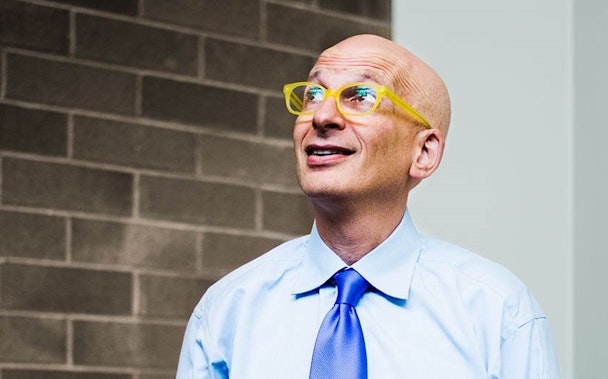Seth Godin on responsible news output, measuring empathy and content marketing
Author and teacher of the marketing community, Seth Godin recently agreed to take questions from readers of The Drum to help them with their marketing needs and conundrums. Here are a few of the questions that were selected, and his responses.

Seth Godin by bjorn amundsen
Paul Fabretti, comms director, Microsoft
'To what extent can, or should, social platforms be regulated with respect to the distribution of need. With Facebook's size significantly impacting the distribution of news, and Twitter so often breaking it, is it enough for the platforms to merely say they are behaving responsible? In the same way there is a code of conduct for British newspapers, should there be a 'social industry-wide' agreement on responsible news behavior?'
Seth: Thanks Paul.
Over the years, a loud, well-funded movement has been built up trying to persuade the public that regulation is always a bad thing. A quick look at how much safer cars have become makes it clear that this is nonsense. The purpose of civilization isn’t to support capitalism, the purpose of capitalism is to support civilization. And when it doesn’t, it’s our job to regulate it so it does.
Most public companies are staffed with people who would actually prefer it if there were regulations, clear boundaries and built-in standards. They don’t want to race to the bottom, and a clear set of rules allows them to compete without ruining our lives…
How to regulate social networks? I’m not sure there’s an obvious answer, but I’m sure that if we don’t get started, we’ll never find a good one.
John Pollard, EVP Donuts, Inc
What do you believe is the most important branding element or marketing channel for businesses to focus on when tackling today's myriad customer touch points?
Seth: 100% sure it’s permission. The privilege of talking to people who want to be talked to. To be able to text someone when their order is ready, or have them call you when they have a complaint. The ability to treasure attention and trust and to use it on behalf of those we seek to serve.
Tina Fegent, marketing procurement consultant
We are seeing a period of real change in the agency marketplace. Agency models, media owner ethics, client behaviours are all being questioned. I listened to a podcast this week where Jon Wilkins from Karmarama said that to transform is to be brave. With Purple Cow you encourage us to find something that makes us different from the crowd and be remarkable. Can agencies especially holding companies be either brave or remarkable when they have huge legacy structures and systems? Where do they start? At the top as WPP has to?
Seth: We can only begin with ourselves. Part of that means holding those we work with to a higher standard, and making difficult choices. Our ethics are what we do when we think no one else is looking.
So we make choices about who we take on as clients, as vendors, as bosses and employees. When we transfer attention and money, we’re voting.
Those standards are contagious, aren’t they?
Stephen Jenkins, founder & MD, Too Many Dreams Limited and altMBA17 alumni
The altMBA teaches us the importance of empathy and the need for marketers to consider themselves agents of change. Whilst this approach can no doubt deliver greater long term success, in an era where everything is measured and short-term metrics have become the focus, particularly in the board room, how do you convince your clients or your boss that this gradual, permission-based growth is a tenable strategy? What should you measure and how should you convince them to trust this approach?
Seth: Thanks Stephen.
I’ve found that too much time convincing is a waste to more time demonstrating.
People believe what they see.
And so we can build small assets and nurture them.
The bosses aren’t going to let us off the hook and encourage us to go do what we want. Instead, we need to put ourselves ON the hook and go do it. And then take responsibility and give away credit…
Along the way, case studies and books and etc are all great things to share.
But don’t wait.
Samuel Scott, global marketing speaker and a columnist for The Drum
In 2008, you said that "content marketing is the only marketing left. ” Do you still stand by that statement, or do you think you were wrong?
Seth: This is a widely misunderstood quote. I didn’t mean “scammy short-term Content Marketing with a capital C and a capital M is all that’s left.” I meant, “we’re judged by what we do now, not simply but what we say.” It’s not our ads that matter as much the change we make in the world...
Nancy Hill, chief executive of Media Sherpas and former president/chief executive of 4A's
We are quickly entering a world where anything is possible-one in which AI and VR are allowing companies to both provide utility we never imagined and know more about us at the same time. At what time do companies need to say to themselves, “just because we can, doesn’t mean we should”? Does this mean companies have to get better at policing their ethics or will consumers provide that gut check with their wallets?
Seth: Thanks Nancy!
I think it’s clear from my other answers… this is a question we’ve always wrestled with (should the East India Company be in the slave trade?) And the best approach has always been: Today’s the best day to be a human. To own your decisions. To do work that matters….
Register for Seth Godin's newsletter to follow his thoughts through his regularly updated blog.

